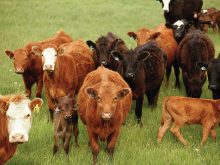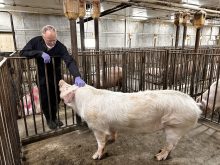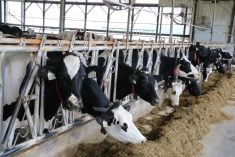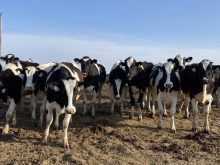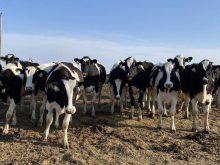Livestock trailers are considered the most likely method of spreading the devastating hog disease into Canada
Western Canadian hog producers say the risk is high that porcine epidemic diarrhea will enter the country from the United States because of Canadian regulatory changes.
The Canadian Food Inspection Agency recently served notice that as of Oct. 1, it will cancel an emergency protocol in Manitoba that ensured stringent washing, disinfecting and drying of livestock transport trucks returning from the United States. The measure allowed trucks to cross into Canada from the U.S., be specifically tagged and then taken directly to a wash station for thorough disinfection.
Read Also

Farming Smarter receives financial boost from Alberta government for potato research
Farming Smarter near Lethbridge got a boost to its research equipment, thanks to the Alberta government’s increase in funding for research associations.
PED is endemic in the U.S., where millions of piglets have died from the virus, and trailers are considered the most likely method of spreading it.
The CFIA said in an Aug. 24 notice that PED no longer requires an emergency response.
It will instead enforce requirements that livestock trailers returning to Canada from the U.S. be cleaned and disinfected on the U.S. side.
“That policy and cleaning and disinfecting trucks in the U.S. to prevent disease entry into Canada sounds good in theory, but in practice, the location, quality of the U.S. truck washes makes this policy extremely difficult to apply consistently to the standard that we are used to and expect in Western Canada,” said Alberta swine veterinarian Dr. Kurt Preugschas.
Hog transport trucks and trailers travel across Western Canada, so the risk of viral transmission will be higher for all producers, he added.
Andrew Dickson, general manager of Manitoba Pork, said his organization and the Manitoba government asked the CFIA to continue the emergency protocol or at least delay a return to previous regulations until recommendations for better rules can be considered.
“Those negotiations came to naught, essentially because CFIA demanded that the province accept full liability for the introduction of all farm animal diseases into Canada,” said Dickson.
“We are extremely concerned about this because essentially we’re going to be sending trailers to be fire hose washed at some point in the United States, where they’re probably going to pick up some PED virus and will be adding to the viral load that our producers currently have to deal with in the province.
“This just, in time, will mean that more virus will enter the environment here in Manitoba and you will increase the potential exposure at the farmgate of this disease. It’s very unfortunate.”
Manitoba has had seven premises infected with PED since it was found in Canada last year. Saskatchewan, Alberta and British Columbia have not been infected, although continued testing in Alberta has shown several positives for the virus on inert surfaces.
CFIA regulations require trucks on the U.S. side to be cleaned and disinfected according to industry guidelines. However, hog producer groups say they lack confidence in U.S. truck washing facilities and protocols.
Preugschas and Manitoba Pork chair George Matheson both quoted research done by animal disease expert Dr. Leigh Rosengren on the subject.
She found there are not enough American truck wash facilities on major transportation routes that are capable of meeting CFIA washing standards.
As well, she found few U.S. wash facilities had the infrastructure needed to wash, disinfect and dry hog transport vehicles that had been in areas with high risk of disease.
Rosengren concluded that the disease risk posed to the Canadian swine industry from reliance on American facilities for proper cleaning was unjustifiable.
“In other words, there is significantly higher risk that PED virus or any other disease … will be brought into Canada as a consequence,” said Preugschas.
In a letter to producers, Matheson said the CFIA’s plan will also create export difficulties because trucks will be stalled at U.S. washing facilities. Many U.S. truck washes do not accept trucks with bedding inside.
A further concern is that CFIA regulations do not require full washing of trucks and trailers that re-enter Canada after delivering to American processing plants. Those rules apply only to units that have gone to other locations.
Trucks and trailers coming from abattoirs need to be only scraped out rather than washed or disinfected.
“I still haven’t figured out how this makes any sense from a biosecurity standpoint,” Preugschas said.
PED virus has been found at U.S. processing plants and is considered endemic across the country.
The CFIA said is it legally required to apply the regulations as detailed in the Health of Animals Act. In a list of questions and answers available on its website, it suggests producers can undertake additional washing and disinfection of trucks on the Canadian side.
Preugschas said he hopes producers will do that, even though it is an additional expense. In the meantime, he said the Canadian Association of Swine Veterinarians is preparing a position statement it will present to the CFIA to guide changes to the regulations.
Producers in all western provinces are also being asked to contact their MPs and complain about the change.






